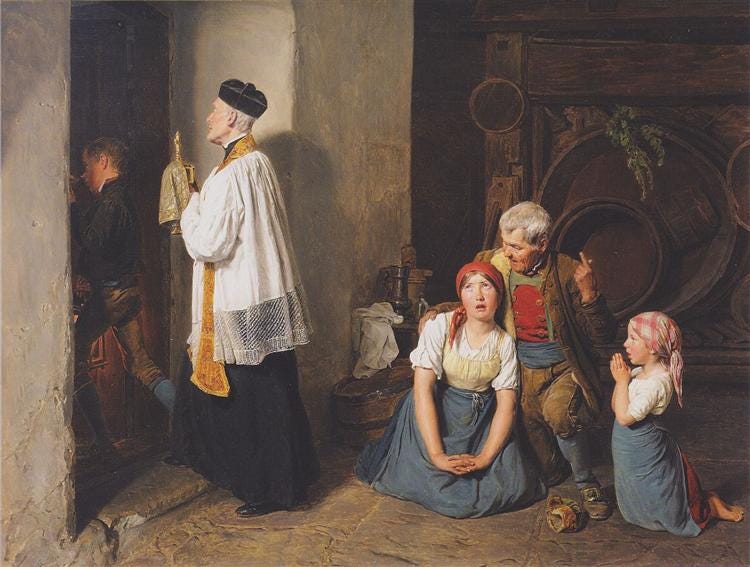Mafia Funerals
And deathbed conversions
There is something about a Mafia funeral, I always feel, that conveys a depth of feeling that other funerals simply do not reach. You may remember the funeral of don Corleone, which was superbly filmed by Francis Ford Coppola. You can watch it here.
I am not a film critic, but the glory of this scene is to be found in the sparing nature of the dialogue, which allows the silences, the looks, the smiles and the frowns to be so eloquent. The coffin and the flowers hardly feature, forming as they do the backdrop to Barzini’s plot to kill Michael. And has Michael ever looked so good, so cold, so deadly and so beautiful?
There is no music in the scene, only the sound of traffic from the motorway that runs over the cemetery. The motorway in question is the Long Island Expressway and the cemetery is Calvary Cemetery in Queens. (There is an informative article about it here.) Incidentally, there is a funeral scene in The Sopranos where Jackie Aprille Jnr is laid to rest, which is set in the Jersey City and Harsimus Cemetery, New Jersey, obviously, and which features an even more hideous elevated motorway, this time the Jersey Turnpike. The way the camera dwells on this unlovely suburban monstrosity must be a homage to The Godfather. You can watch the scene here.
Mafia movies are always going to make a great scene out of funerals. One reason for this is that funerals are not as well frequented as they once were, so for many they are fascinating to watch, being familiar in concept but unknown in experience. Then there is the simple fact that Mafia fiction is really about death: all the characters are going to die, most of them violently, and death cannot be put off. The funeral is a nice reminder of this - and incidentally a reminder that all of us need, not just the members of the criminal confraternity.
Mario Puzo does not describe the funeral of don Corleone at all; the scene in the film comes from the genius of Francis Ford Coppola. But Puzo does pay his tribute to the Grim Reaper in the opening chapter of the novel when the Don and his sons go to visit the dying consigliere Genco. Genco asks the Don, as it is his daughter’s wedding day, and he cannot refuse a request, to save him from death. ‘You blaspheme, resign yourself,’ says don Corleone to his old friend. The Don may be powerful, but against death he has no power.
This passage (pp 46-47 of the paperback) is not Puzo’s finest but it does lay down the principle theme of all Mafia fiction. The boss controls everything, but in the end he does not control death, and though he can dispense it to others, he too must pay the debt to nature.
In the end the great Mafioso has to surrender to a higher power, which is one of the things that I have been writing about when one on the minor characters in the successors to my Catania trilogy approaches his end through natural causes. This is a blessing, of sorts, as it allows the traditional choreography of death its full scope. As the slow illness advances, and the end has to be faced, the great climax is the calling of the priest, the confession, the anointing, the absolution, and the reception of Holy Communion. This represents the triumph of the women of the clan, who gather downstairs while the dying man is visited by the priest, and it is this triumph, the answer to all their prayers, and the prayers of many a decade, that sweetens the grief that death brings. In addition there is the hurried restoration and tidying up of the mortuary chapel in the cemetery of the village where the family originates. There is always so much to organise when it comes to a traditional Sicilian funeral. After this, the death itself is an anti-climax, though the drama can warm up again with the contents of the will becoming known.
The Mafioso who dies in his bed, accepting the ministrations of the Church, dies, in a sense, defeated, even if destined for Heaven. There is a nice irony to this: he tries to dominate all his life long, and in the end is dominated by the impersonal power of God, the Church and the prayers of his womenfolk. Other Mafiosi may die in action, with no chance of repentance; but whichever way, death is the final defeat for the man of honour.


